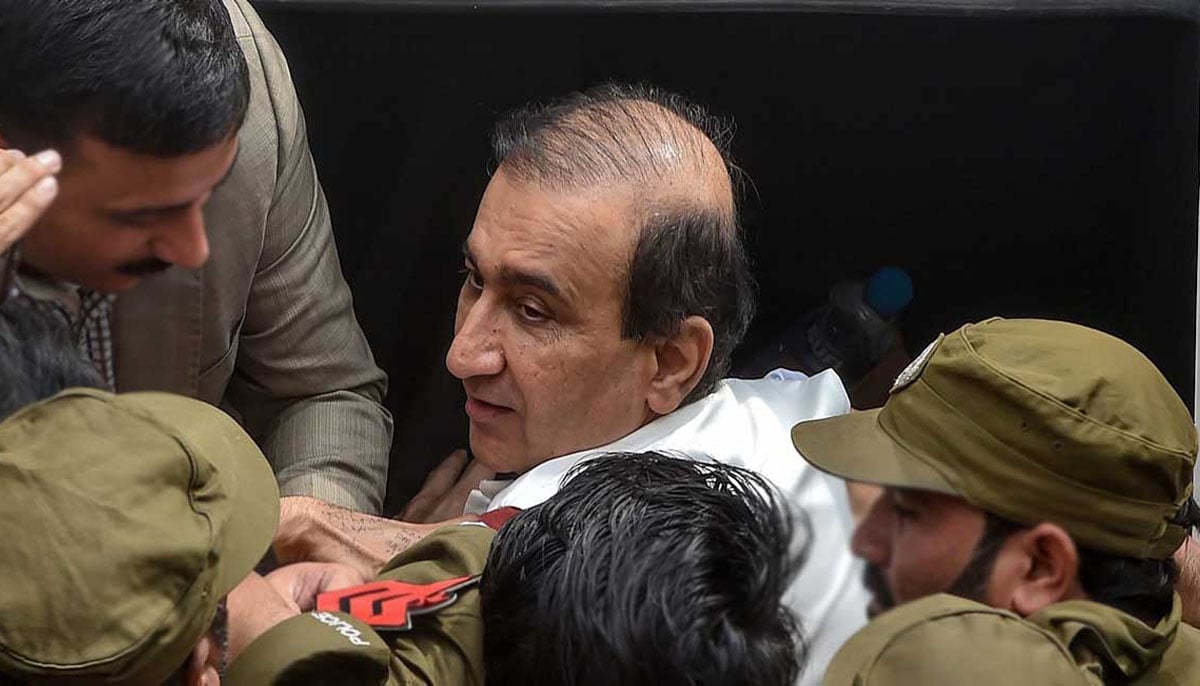Protest against illegal arrest of Mir Shakil-ur-Rahman continues
LAHORE/PESHAWAR: Jang, Geo and The News workers continued their protest on Sunday against the illegal arrest of Editor-in-Chief Mir Shakil-ur-Rahman outside the Jang Offices and demanded the government to immediately release him.
The protesters were carrying banners and shouting slogans demanding the release of Mir Shakil-ur-Rahman. Prominent among the protesters included senior journalists Zaheer Anjum, Awais Qarni, Jang Workers Union Secretary Muhammad Farooq Awan, Muhammad Ali, Wahab Khanzada, Sheikh Aziz, Afzal Shah and others.
They said Mir Shakil-ur-Rahman was in illegal detention for the past 198 days. They urged the government to release him immediately and withdraw all bogus cases against him. They shouted slogans against the NAB-Niazi nexus.
Zaheer Anjum said the arrest of Mir Shakil-ur-Rahman was an attack on independent media. He asked the opposition parties to raise their voice and said silence was a crime. “Free media and democracy go hand-in-hand and the government is trying to weaken democracy by gagging the voice of media,” he added. Mir Shakil-ur-Rahman was arrested in a case pertaining to a 34-year-old property transaction that has nothing to do with the government, Muhammad Farooq said.
He said the circle of protest would be widened, urging the government to face the truth and restrain from adopting a fascist attitude. He added that the PTI government could not face the facts and truth.
He said the rulers were running the country with a dictatorial attitude. Awais Qarni said Mir Shakil-ur-Rahman will never bow before any power as he was the custodian of freedom of expression and freedom of media.
Munawar Hussain said editor-in-chief was the torchbearer of freedom of journalism and his arrest was illegal and unjust. He said there was no concept of democracy without freedom of media. Media plays a vital role in strengthening democracy, adding journalists and Jang Group workers will continue protest till the release of Mir Shakil-ur-Rahman.
In Peshawar, the journalists continued the protest against the arrest of the Jang/Geo Group Editor-in-Chief Mir Shakil-ur-Rahman on Sunday and sought his immediate release. They gathered outside the offices of Daily Jang, The News and Geo TV to register anger at the illegal incarceration. The protesters were carrying banners and placards. They raised slogans against the Pakistan Tehreek-e-Insaf (PTI) government and in support of press freedom.
Those who spoke on the occasion included Sardar Imdad Ali Qazalbash, Arshad Aziz Malik, Shakeel Farman Ali, Sabz Ali Shah, Qaiser Khan, Nasreen Jabeen, Rasool Dawar, Shah Zaman, Ansar Abbas, Raham Dil and others. The speakers were critical of the arrest of Mir Shakil-ur-Rahman and his detention for the last over six months. They said the PTI government had arrested Mir Shakil-ur-Rahman on false charges on March 12 and continued to be interned for the last 200 days.
The protesters said the Jang Group chief had been arrested to force the independent media into submission and warn other media houses to quit objective reporting. They criticized the National Accountability Bureau (NAB) for victimizing opposition and independent media. The speakers lamented that the anti-graft body was highly biased and reluctant to take any action against the PTI members allegedly involved in corrupt practices.
They dared NAB to move against those involved in wheat flour, sugar crises, Malam Jabba land, Billion Tree Tsunami and Bus Rapid Transit scandals. The protesters requested the apex court to take notice of the case and provide justice to the head of the Jang/Geo Group.
-
 Prince Harry And Meghan Unlikely To Meet Royals In Jordan
Prince Harry And Meghan Unlikely To Meet Royals In Jordan -
 Hero Fiennes Tiffin Shares Life-changing Advice He Received From Henry Cavill
Hero Fiennes Tiffin Shares Life-changing Advice He Received From Henry Cavill -
 Savannah Guthrie's Fans Receive Disappointing News
Savannah Guthrie's Fans Receive Disappointing News -
 Prince William Steps Out For First Solo Outing After Andrew's Arrest
Prince William Steps Out For First Solo Outing After Andrew's Arrest -
 Jake Paul Chooses Silence As Van Damme Once Again Challenges Him To Fight
Jake Paul Chooses Silence As Van Damme Once Again Challenges Him To Fight -
 Google Disrupts Chinese-linked Hacking Groups Behind Global Cyber Attacks
Google Disrupts Chinese-linked Hacking Groups Behind Global Cyber Attacks -
 Four People Killed In Stabbing Rampage At Washington Home
Four People Killed In Stabbing Rampage At Washington Home -
 Meghan Pushes Prince Harry Into Territory That’s Dangerous To His Brand: ‘She Isn’t Hearing A Word Of It’
Meghan Pushes Prince Harry Into Territory That’s Dangerous To His Brand: ‘She Isn’t Hearing A Word Of It’ -
 Christina Applegate Reflects On Lasting Impact Of Being Molested In Childhood
Christina Applegate Reflects On Lasting Impact Of Being Molested In Childhood -
 Martin Short Makes Big Decision Following Tragic Death Of Daughter
Martin Short Makes Big Decision Following Tragic Death Of Daughter -
 Antarctica’s Mysterious ‘gravity Hole’: What’s Behind The Evolution Of Earth’s Deep Interior?
Antarctica’s Mysterious ‘gravity Hole’: What’s Behind The Evolution Of Earth’s Deep Interior? -
 Hilary Duff Addresses Ashley Tisdale's 'toxic Mom Group' Claims And Matthew Koma's Firey Response
Hilary Duff Addresses Ashley Tisdale's 'toxic Mom Group' Claims And Matthew Koma's Firey Response -
 Jack Hughes's Proximity To Trump Angers Tate McRae Fans
Jack Hughes's Proximity To Trump Angers Tate McRae Fans -
 Neve Campbell Opens Up About Her 'difficult Decision' To Not Sign 'Scream 6'
Neve Campbell Opens Up About Her 'difficult Decision' To Not Sign 'Scream 6' -
 Nobel-winning Scientist Resigns From Columbia University After Epstein Links Revealed
Nobel-winning Scientist Resigns From Columbia University After Epstein Links Revealed -
 Prince William Remarks At BAFTAs 'indicative' Of King Charles Physical, Mental Health Too
Prince William Remarks At BAFTAs 'indicative' Of King Charles Physical, Mental Health Too




